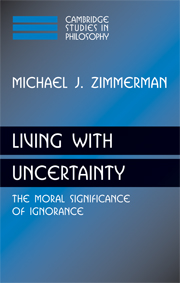1 - Ignorance and obligation
Published online by Cambridge University Press: 22 September 2009
Summary
“Ought” is ambiguous. Few deny this fact. It straddles several distinctions. One such distinction is that between what is counseled by morality and that which is counseled, not by morality, but by reason, or prudence, or aesthetics, or the law, and so on. Within the broad category of morality, there is another distinction between that which is required or obligatory and that which is merely recommended. Within the category of moral obligation, there is still another distinction between that which is overall obligatory and that which is merely prima facie obligatory. “Ought” may be properly used in all such contexts.
So much I presume. In this chapter I will focus on the concept of overall moral obligation, and I will address yet another alleged distinction: that between what are often called objective and subjective obligation. It is frequently claimed that “ought” (together with associated terms, such as “right” and “wrong”) may be, and is, used to express both forms of obligation, and that as a result people sometimes find themselves talking at cross-purposes. Consider what W. D. Ross has to say on the matter:
[W]hen people express different opinions about the rightness or wrongness of an act, the difference is often due to the fact that one of them is thinking of objective and the other of subjective rightness. The recognition of the difference between the two is therefore in itself important as tending to reconcile what might otherwise seem irreconcilable differences of opinion.
- Type
- Chapter
- Information
- Living with UncertaintyThe Moral Significance of Ignorance, pp. 1 - 71Publisher: Cambridge University PressPrint publication year: 2008



